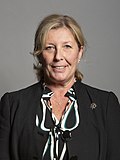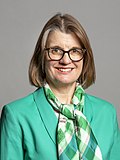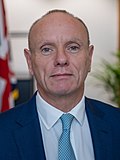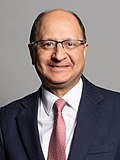| Minister | Position before reshuffle | Position after reshuffle |
|---|
 | Tom Pursglove MP | Parliamentary Under-Secretary of State for Justice and Tackling Illegal Migration | Minister of State for Crime and Policing |
 | Simon Baynes MP | Backbench MP | Parliamentary Under-Secretary of State for Justice and Tackling Illegal Migration |
 | Andrea Jenkyns MP | Assistant Government Whip | Parliamentary Under Secretary of State for Skills, Further and Higher Education |
 | Graham Stuart MP | Backbench MP | Minister of State for Europe |
 | Rehman Chishti MP | Backbench MP | Parliamentary Under Secretary of State for North America, Sanctions and Consular Policy |
 | Trudy Harrison MP | Parliamentary Under-Secretary of State for Transport | Minister of State for Transport |
 | Karl McCartney JP MP | Backbench MP | Parliamentary Under-Secretary of State for Transport |
 | Leo Docherty MP | Parliamentary Under-Secretary of State for Defence People and Veterans | Minister for Defence People |
 | Alex Chalk QC MP | Solicitor General for England and Wales | Resigned from the government |
 | Edward Timpson CBE MP | Backbench MP | Solicitor General for England and Wales |
 | Will Quince MP | Parliamentary Under-Secretary of State for Children and Families | Resigned from government |
 | Brendan Clarke-Smith MP | Backbench MP | Parliamentary Under Secretary of State for Children and Families |
 | Robin Walker MP | Minister of State for School Standards | Resigned from government |
 | Will Quince MP | Backbench MP | Minister of State for School Standards |
 | John Glen MP | Economic Secretary to the Treasury | Resigned from the government |
 | Richard Fuller MP | Backbench MP | Economic Secretary to the Treasury |
 | Stuart Andrew MP | Minister of State for Housing | Resigned from the government |
 | Marcus Jones MP | Comptroller of the Household | Minister of State for Housing |
 | Victoria Atkins MP | Minister of State for Prisons and Probation | Resigned from the government |
 | Stuart Andrew MP | Backbench MP | Minister of State for Prisons and Probation |
 | Jo Churchill MP | Parliamentary Under-Secretary of State for Agri-Innovation and Climate Adaptation | Resigned from the government |
 | Kemi Badenoch MP | Minister of State for Local Government, Faith and Communities | Resigned from the government |
 | Paul Scully MP | Parliamentary Under-Secretary of State for Small Business, Consumers and Labour Markets | Minister of State for Local Government, Faith and Communities |
 | Jane Hunt MP | Parliamentary Private Secretary to the Cabinet Office | Parliamentary Under-Secretary of State for Small Business, Consumers and Labour Markets |
 | Neil O'Brien OBE MP | Parliamentary Under-Secretary of State for Levelling Up, The Union and Constitution | Resigned from the government |
 | Lia Nici MP | Parliamentary Private Secretary to the Prime Minister | Parliamentary Under-Secretary of State for Levelling Up, The Union and Constitution |
 | Alex Burghart MP | Parliamentary Under-Secretary of State for Apprenticeships and Skills | Resigned from the government |
 | Lee Rowley MP | Parliamentary Under-Secretary of State for Business and Industry | Resigned from the government |
 | Julia Lopez MP | Minister of State for Media, Data, and Digital Infrastructure | Resigned from the government |
 | Matt Warman MP | Backbench MP | Minister of State for Media, Data, and Digital Infrastructure |
 | Mims Davies MP | Parliamentary Under-Secretary of State for Employment | Resigned from the government |
 | Julie Marson MP | Backbench MP | Parliamentary Under-Secretary of State for Employment |
 | Rachel Maclean MP | Minister for Safeguarding | Resigned from the government |
 | Amanda Solloway MP | Lord Commissioner of the Treasury | Minister for Safeguarding |
 | Mike Freer MP | Parliamentary Under-Secretary of State for Exports | Resigned from the government |
 | Andrew Griffith MP | Minister for Policy | Parliamentary Under-Secretary of State for Exports |
 | Edward Argar MP | Minister of State for Health | Resigned from the government |
 | Maria Caulfield MP | Parliamentary Under-Secretary of State for Patient Safety and Primary Care | Minister of State for Health |
 | James Morris MP | Vice-Chamberlain of the Household | Parliamentary Under-Secretary of State for Patient Safety and Primary Care |
 | Helen Whately MP | Exchequer Secretary to the Treasury | Resigned from the government |
 | Alan Mak MP | Lord Commissioner of the Treasury | Exchequer Secretary to the Treasury |
 | Rt Hon Damian Hinds MP | Minister of State for Security and Borders | Resigned from the government |
 | Stephen McPartland MP | Backbench MP | Minister of State for Security |
 | George Freeman MP | Parliamentary Under-Secretary of State for Science, Research and Innovation | Resigned from the government |
 | Guy Opperman MP | Parliamentary Under-Secretary of State for Pensions and Financial Inclusion | Resigned from the government |
| Backbench MP | Parliamentary Under-Secretary of State for Pensions and Financial Inclusion |
 | Chris Philp MP | Parliamentary Under-Secretary of State for Tech and the Digital Economy | Resigned from the government |
 | Damian Collins MP | Backbench MP | Parliamentary Under-Secretary of State for Tech and the Digital Economy |
 | James Cartlidge MP | Parliamentary Under-Secretary of State for Justice | Resigned from the government |
 | Sarah Dines MP | Assistant Government Whip | Parliamentary Under-Secretary of State for Justice |
 | Rebecca Pow MP | Parliamentary Under-Secretary of State for Nature Recovery and the Domestic Environment | Resigned from the government |
 | Steve Double MP | Assistant Government Whip | Parliamentary Under-Secretary of State for Nature Recovery and the Domestic Environment |
 | James Heappey MP | Parliamentary Under-Secretary of State for the Armed Forces | Minister of State for the Armed Forces |
 | Peter Bone FCA MP | Backbench MP | Deputy Leader of the House of Commons |
 | The Lord Greenhalgh | Minister of State for Building Safety and Fire | Resigned from the government |












































































